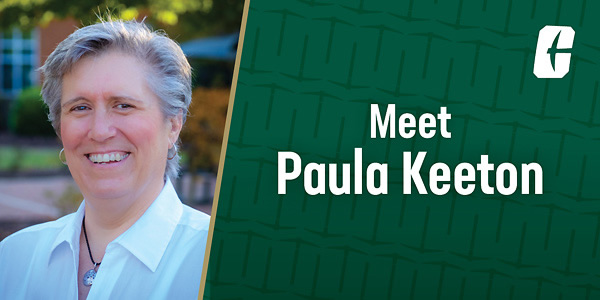
Paula Keeton is the director of the Center for Counseling and Psychological Services and has worked in college mental health for more than 25 years. Learn about Keeton’s passion for mental health, why Niner Nation is unique and activities she does in her free time.
Describe your job and what you do at UNC Charlotte.
As director of the Price Center for Counseling and Psychological Services (CAPS), my job involves a great deal of variability from day to day. I’m a licensed psychologist in the state of North Carolina. From an overarching perspective, I provide leadership within CAPS and to the campus community regarding student mental health. In collaboration with my leadership team, I establish and oversee agency goals as well as policies and procedures for the provision of clinical, crisis, outreach, referrals and training services; supervision of clinical and support staff, graduate and intern training, outreach and engagement with the community; consultation with administrators, faculty, staff, parents and students; and service to the University community. I represent CAPS to the University in informal relationships as well as more formally on committees and special projects. I’m responsible for maintaining contemporary standards of practice for all facets of CAPS services. To the extent that my schedule allows, I provide direct clinical services to students.
What’s your favorite part about being at UNC Charlotte? What about your favorite part of the job?
My favorite part of being at UNC Charlotte are the students. Despite having worked in college mental health for over 25 years, students’ resilience, brilliance and passions still inspire me every day. Niner Nation brings its own unique flair to this! Above and beyond all things, I see that Charlotte students, staff and faculty seem to genuinely care about one another. Part of my mission is to continue to nurture this community of care and compassion.
My favorite part of the job is that no two days are the same. Even within a single day, I’m able to have a great deal of variety. My days might include a staff meeting, a meeting with my supervisor, administrative supervision with one of my staff members, a meeting with the SAMHSA grant team, supervision of a trainee, co-facilitation of a therapy group and an outreach program in the evening.
What’s something about your job that most people don’t know?
People seem to know that I’m in a lot of meetings. What they don’t know is that I’m one of those people who actually likes meetings. I have a great appreciation for the energy and creativity that happens when people are focused on a shared question, vision, concern or task.
What is something you’re most excited about for the fall semester?
I’m most excited about seeing the campus continue on its trajectory of healing and recovering from the pandemic. COVID-19 seems to have impacted not only people’s mental health, but general sense of well-being and security. At my core, I am an optimist, and I have confidence in the campus, nation and world’s recovery.
When you’re not on campus, what are some things you do in your free time?
My free time is occupied with lots of different interests. I like cooking and trying new recipes. I enjoy doing simple woodworking. I love re-reading beloved books (I’ve read “The Lord of the Rings” over 30 times and learn something new with every re-read). I can also be a bit of a couch potato and enjoy watching both domestic and international reality shows. Lastly, I have a 3-year-old dog who still thinks she’s a puppy. She sees my “free time” as HER time.
What’s a place on campus you think every student should visit?
I don’t think it’s a singular place. I want every student to explore the campus broadly and discover what they passionately care about and connect with. Of course, I’d encourage every student to visit the four offices within the health and well-being area: CAPS, Center for Wellness Promotion, Student Health and UREC.
What piece of advice would you give to a new student?
A piece of advice I’d offer a new student is this: Work through the fear and anxiety you might have about asking questions. Coming to college is the opportunity to learn, to broaden your vision and to expand your thinking. Ask for help as needs arise — reach out when the “water rises” to your knees, rather than waiting until you feel like you’re drowning. CAPS is here to help.